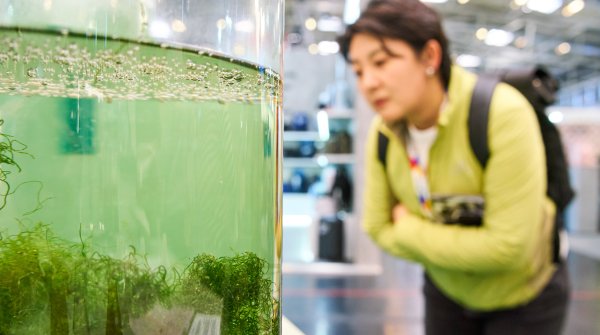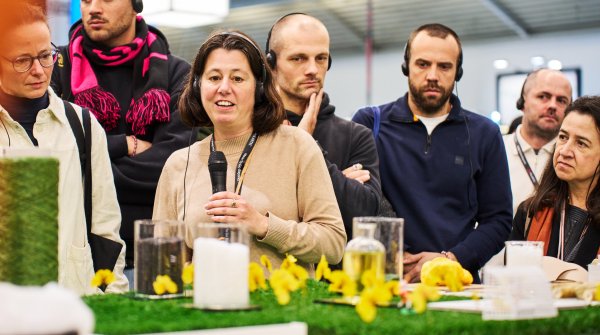The idea is actually very old: things that are broken or worn out are repaired so that they can be used for many more years. But because production and use are now often so far apart that they usually even take place on different continents, many repair services have gradually disappeared - and not just in the sporting goods industry. As a result, when something breaks, it is simply bought new. Replacing instead of repairing is the motto that more and more manufacturers have taken to heart. They prefer to replace defective products under warranty with new ones rather than repair the old ones. Today we know that this development is damaging our planet and therefore also us humans. That's why a lot is changing - including when it comes to repairs. After all, repair and care services are currently experiencing a brilliant comeback at retailers and manufacturers.
"We want to become the number one workshop in German sports retail," says Michael Kiess, Leader Service Experience at Decathlon Germany, during the opening of a national repair workshop in the Decathlon store in Munich. It is the third in the whole of Germany. Special repair services that require special knowledge or machines are bundled here. Customers can also have their products serviced and repaired in all 90 Decathlon stores in Germany. This applies not only to products from the Decathlon brand family, but generally to sports products from all brands. The company currently offers 21 different repair processes in Germany. The focus and most frequently used service is in the area of cycling and mobility with products such as bicycles, scooters and skates. There are also repair services for winter sports equipment, mountain sports equipment (such as tents), water sports equipment (such as SUPs and kayaks) and fitness equipment. Clothing is also repaired. In 2023, Decathlon repaired around 120,000 products in Germany and more than 2.7 million products worldwide.
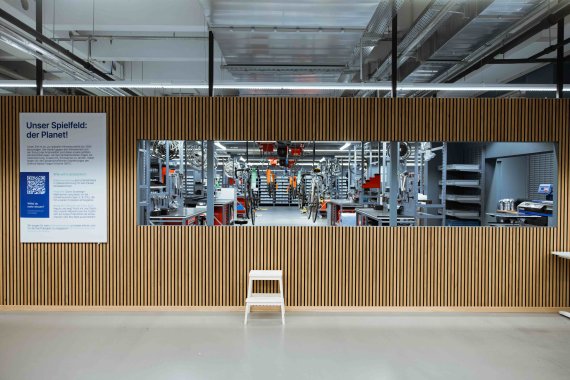
More use with fewer products is the retail group's motto. To achieve this, seven more regional workshops are to be added over the next three years. The locations in Hamburg and Berlin have already been decided. "We want to set up such workshops in all regions in Germany in order to save transportation routes and, of course, time," continues Kiess. Repair cafés, separate small workshops that are not integrated into existing branches and spare parts vending machines (such as
"tube vending machines" for bicycle tubes) are also on the agenda. Decathlon wants to repair 500,000 products in Germany by 2027 - around four times as many as today.
More and more retailers and brands are expanding or launching their repair service. The repair service is also growing at multi-brand retailer Globetrotter. "Last year, 33,000 repairs were carried out - and the trend is still rising," says Christiane Gawlik, Product Lifecycle Manager at Globetrotter. After Globetrotter opened its first repair workshop in Dresden in 2018, 16 other stores have since been equipped with them. There is also a central workshop in Ludwigslust. In the long term, all 22 stores will operate their own workshops. Through new workshop partnerships, such as with Ortlieb or, since August, with Vaude, additional services are constantly being added to meet the growing demand.
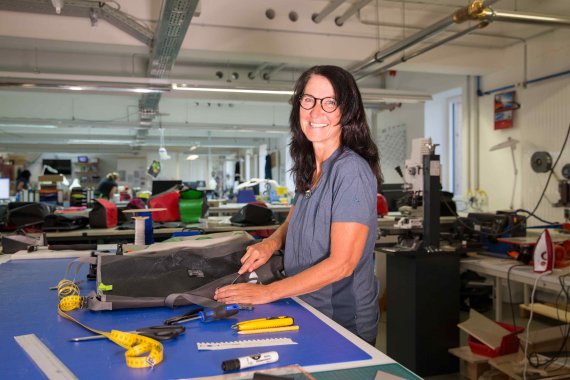
Manufacturers that still produce at their headquarters or continue to operate their own workshops there have often been offering repairs for decades - such as Lowa or Schöffel. But Schöffel has also noticed that demand is growing. "Last year we had around 4,900 repairs in our Service Factory, this year it will be around 5,500," explains Ludwig Schuster, Head of the Schöffel Service Factory at the company headquarters in Schwabmünchen. The repair service has been around since 1961. "In the past, it was more for reasons of thrift - people wanted to repair rather than replace things - and today it is mainly for reasons of sustainability," says Schuster.
Young brands such as the French sneaker brand Veja have also been relying on repair services since the company introduced the "Clean, Repair and Collect" project in 2020. As a result, Veja's flagship stores, which opened in Brooklyn, New York, and London in April this year, have had their own workshops for several years. Here, customers can have their shoes cleaned and repaired, or hand them in for recycling if they cannot be repaired. To date, Veja has repaired over 20,000 pairs of shoes from all brands.
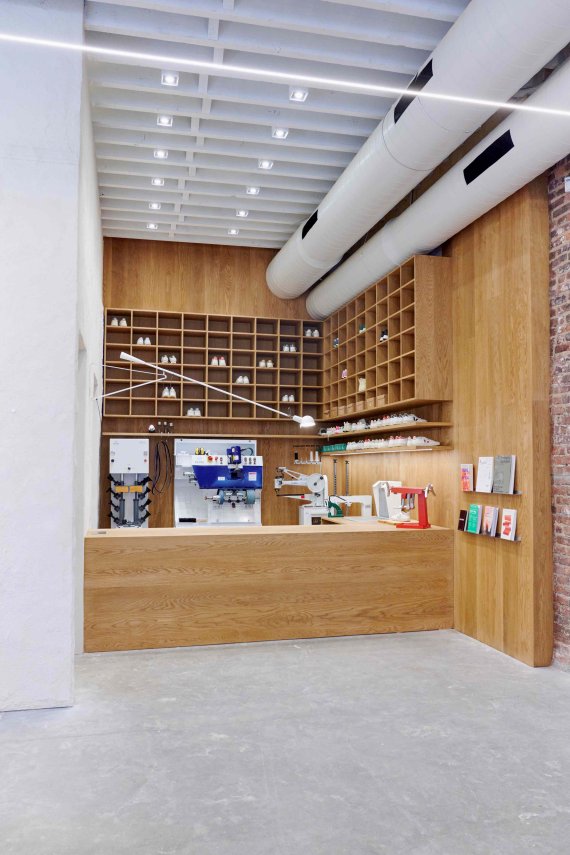
Repair services are by no means a privilege of clothing manufacturers. "We don't see a big difference for hard goods," says Eicke Thiele, Sales and Marketing Director of the outdoor equipment brand Exped. "In fact, the repair of these sometimes valuable products has a greater impact than with clothing." Repairing tents and sleeping mats is often very costly, "but these are often products with a comparably large footprint; therefore, conversely, we also see great potential for the repair of textile hard goods and products that can be used for a long time," Thiele continues.
However, demand is not only increasing because more and more people want to have their products repaired, but also because other circular services are directly related to this. "If necessary, we also repair purchased second-hand items before they go on sale," explains Gawlik from Globetrotter. Combining a second-hand range with a repair service simply makes sense if the aim is to extend the lifespan of products. Decathlon also sees the repair service as a key element in further efforts to increase circularity. "Without repair, we wouldn't be able to offer any of our other circularity services," explains Kiess. In addition to repairs, there is also a buy-back service where Decathlon buys back used products, repairs them and resells them as second-hand products. A rental service for sports equipment is also being launched. Here too, the products have to be continuously maintained and repaired before they can be rented out again.
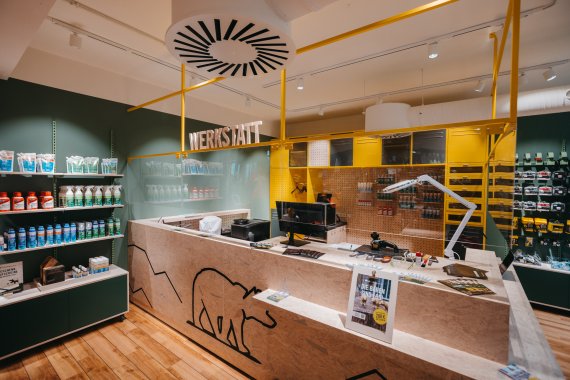
Even sleeping bags are suitable as rental products. This is the experience of the British outdoor supplier Rab. Rab has been offering a rental program since 2022 and encourages its customers to rent rather than buy rarely used products. The most popular rental items are the most technical sleeping bags and expedition equipment, and these need to be cleaned, waterproofed and, if necessary, repaired after each use. The rental service is still limited to the UK, but expansion is planned.
ISPO Munich 2024 will host exciting events on the topic of repair. It's all about innovative solutions that promote sustainable products and the circular economy. Discover how repair services are driving the industry forward and becoming an important building block for the future of sport and OutDoor.
Repairs are costly. Exped invested a third of the company's profit in sustainability projects in 2023, says Eicke Thiele, "the repair department played a major role. After all, repairing a product is much more expensive than taking it back, throwing it away and giving customers a new product in exchange." For Exped, running the repair department is a major investment. And because the demand for repairs is growing on the part of both brands and consumers, more and more service providers are emerging to support brands and retailers.
Sustainability pioneer Patagonia, for example, is working with the United Repair Center (URC) in Europe. The URC was founded in Amsterdam in 2022 and operates another branch in London. The next branch is to be established in France. A total of eleven brands already use the URC service. The most recent addition was The North Face, "and we will be announcing a number of new partnerships in the coming months," says Thami Schweichler, CEO of the United Repair Center. The URC not only repairs clothing, but also tents, sleeping bags and more. Brands benefit from outsourcing the service because they can use the URC's cross-brand expertise without having to invest in their own infrastructure and training. This increases efficiency on all sides. Schweichler: "Our focus on high-quality, scalable repair services ensures that brands can offer their customers this valuable service efficiently and cost-effectively."
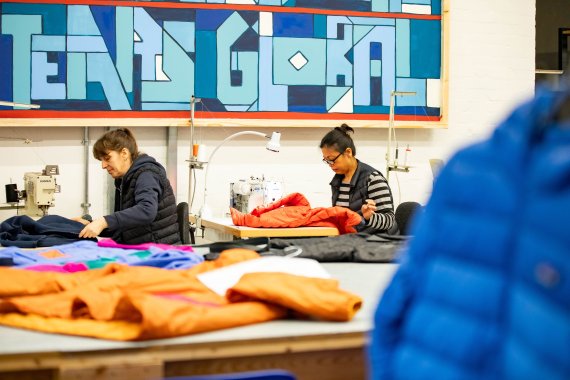
Efficiency is an important keyword. The repair process is time-consuming and cost-intensive and involves many stages, from contact with customers and communication with service providers to logistics and spare parts procurement. The more people and departments are involved, the more complicated it becomes. This was precisely the motivation behind the cooperation between the ski brand Fusalp and the French startup Prolong. Fusalp had long handled its repairs and care services via its own workshop or via retail partners who commissioned local workshops. However, not everywhere with the same quality and speed. Prolong therefore developed a B2B software as a business idea that enables Fusalp and other brands to offer all services cost-efficiently in all sales channels, in the online store, in its own stores and with wholesale partners, and across all markets. Prolong not only digitizes the processes, but also connects the brands with suitable workshops that can carry out services such as repairs, modifications, maintenance or personalization. Prolong is firmly convinced that services such as repairs, maintenance and customization have potential and generate new sales.

Ultimately, however, repair is not just about greater sustainability, meeting demand or efficiency. If you can repair something, you know your trade. Setting up a repair service is therefore always an investment in brand image and customer loyalty. Decathlon has also understood this and it is no coincidence that its workshops are located in the stores with large glass fronts facing the sales area. "We are also concerned with credibility and trust," explains Michael Kiess from Decathlon. "With our own repair service and specialized employees in the workshop, we can show our customers our expertise, which also creates trust."
Anyone who wants to repair a product is usually emotionally attached to it. If a brand finds a good solution for this, it collects sympathy points, and that also pays off. "Repair and maintenance services have considerable potential as sales drivers. They increase brand loyalty, show commitment to sustainability and can attract environmentally conscious consumers, which increases overall sales," says Thami Schweichler from the URC. Schöffel, which uses repair as a marketing theme, has had similar experiences. "We use the service to increase the touchpoints with our customers and regularly receive good feedback in return. We actually become a problem-solving aid for them," says Ludwig Schuster from Schöffel. Similar to Patagonia with its Worn Wear program, Schöffel toured Germany this spring to provide repair services for customers in cooperation with local retailers. The interest from retailers was so great that Schöffel had to do a lot of curating.
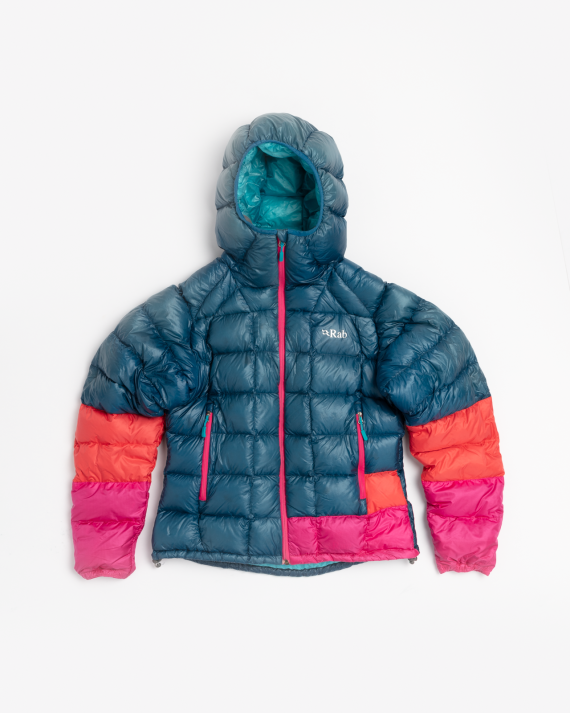
Repaired products have almost achieved a special status. They clearly show that they have been used for a long time and that they are worth using for even longer. Visible patches are therefore not a flaw, but a distinction that brands can flirt with. Like Rab, for example. With the Second Stitch program, Rab deliberately repairs with leftover fabrics and offcuts, even if they don't exactly resemble the original fabrics.
not exactly look like the original fabrics. Why? It gives these products a story, it makes them unmistakable and unique.
- ISPO awards
- Mountain sports
- Bike
- Design
- Retail
- Fitness
- Health
- ISPO Job Market
- ISPO Munich
- ISPO Shanghai
- Running
- Brands
- Sustainability
- Olympia
- OutDoor
- Promotion
- Sports Business
- ISPO Textrends
- Triathlon
- Water sports
- Winter sports
- eSports
- SportsTech
- OutDoor by ISPO
- Heroes
- Transformation
- Sport Fashion
- Urban Culture
- Challenges of a CEO
- Trade fairs
- Sports
- Find the Balance
- Product reviews
- Newsletter Exclusive Area
- Magazine




